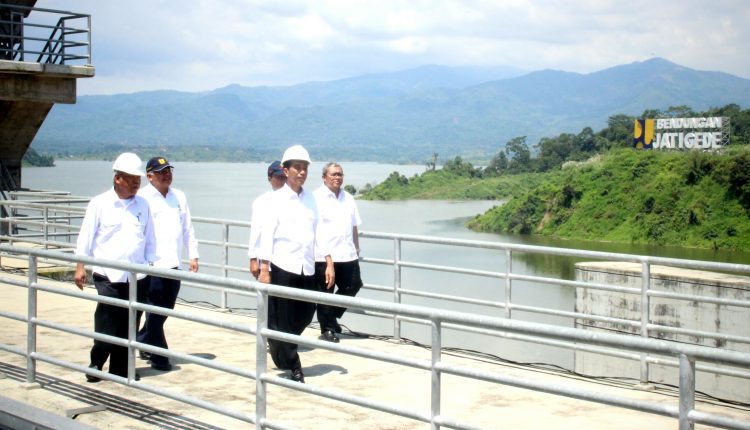By: Mashudi Darta) *
A number of promises have been made by Jokowi during the 2014 presidential election, then what is the realization of those promises? Are there improvements for the Indonesian people?
The Indo Barometer survey results show the electability of President Joko Widodo in several provinces. These results are considered as government work that can be implemented properly.
Jokowi’s electability increase was assessed thanks to the work of realizing the promise – the promise, the government and it was the impact of concrete government work felt by the community.
Jokowi was able to answer problems through concrete work and work such as infrastructure development in the border area. The impact of this development is very significant.
One of his political promises, Jokowi committed to carrying out agrarian reform by dividing 9 million land certificates. And every year there are at least 2 million new jobs created.
During his time as President, Jokowi continued to fix the bureaucracy and public services. Services carried out include arranging taxes, land certificates, and passports. Even to arrange a marriage certificate, if necessary, it is not necessary to go to the Office of Religious Affairs, but it can go directly to the public service mall. This effort was made to fix the bureaucracy.
The National Santri Day is also one of Jokowi’s promises that have been fulfilled. National Santri Day falls on October 22. Santipun also welcomed this decision with joy.
The government also focuses on building infrastructure in all corners of the country. This was considered successful in reducing the price disparity in basic needs in the western and eastern parts of Indonesia, as well as better economic sustainability. This is evidenced by BBM which is priced nationally.
In the economic sector, the Jokowi Government strengthened the small micro business sector (MSMEs) by reducing the interest rate of the People’s Business Credit (KUR) to 9% by pouring Rp. 94.4 trillion.
In overcoming Corruption, Jokowi also promised to strengthen the KPK, this was evidenced by the KPK being given a higher budget than the National Police. Even the salary of a KPK investigator is higher than that of a POLRI investigator.
Jokowi’s promise of village development had become hopeful and included the promise of the main Jokowi Campaign. In fact, since taking office as President of Indonesia, Jokowi has poured trillions of money into village funds that can be utilized directly. Even these funds continue to increase from year to year.
In terms of infrastructure development, Jokowi also succeeded in building a sea highway which is the mainstay of the Jokowi government, with the increase in facilities, the price of products outside Java has decreased and has an impact on the efficiency of production costs.
Sea highway is a freeway shipping route, which connects inter-island ports in Indonesia. After connecting with the sea highway, it is expected that there will be no scarcity of goods such as basic necessities, scarcity of fuel and cement.
In order to prosper the Farmers, Jokowi also officially launched an entrepreneurship program and agricultural digitalization. This program aims to help farmers be more independent and have better bargaining power, so they can provide better welfare to farmers.
In addition, the Government also succeeded in reducing the percentage of poverty levels, recorded in March 2018 the poverty rate fell to 9.86%, which is the lowest percentage in history.
In terms of education level, compulsory education becomes 12 years from the previous 9 years. The Indonesia Smart Card is also intended for students from underprivileged groups, besides that the bidik misi quota in Indonesia also increases.
In the equalization program in the education sector, Presedent emphasized that this equalization program would be a major concern of the government.
He asserted that children in Indonesia can go to school without cost constraints through the Smart Indonesia card, besides that he also said the government was also focusing on improving the quality of primary and secondary education programs that were evenly distributed throughout Indonesia.
Jokowi is also considered very concerned about the development of Indonesia’s outer regions, such as in NTT, Kalimantan and Papua. The construction of road infrastructure in the border area is a priority of the government to facilitate mobility of citizens, promote the regional economy, and improve the welfare of the surrounding community.
To advance the economy in coastal areas, Jokowi has succeeded in establishing an integrated marine and fishery center (SKPT), in
The Jokowi era government also succeeded in increasing Indonesia’s competitiveness in the global arena by continuing to improve regulations. This is supported by the competitiveness of SMEs who are able to participate in formal business activities, the government also cuts UMKM income tax from 1% to 0.5%
In the investment sector, Moody’s Fitch and Standard Poor stated that Indonesia is worthy of Investment in 2018, where S & P last gave
During his leadership, the Tourism Industry managed to contribute foreign exchange to the second largest country in 2017 and was able to attract high
Jokowi’s era leadership has succeeded in concocting the tourism sector into a new prima donna of the country’s economy. this will certainly increase the flow of money.
Although a series of presentations have been achieved, the community is also expected to be wise in addressing this matter and do not need anarchism when conveying its contradictory aspirations.
Such is the short story related to the promises of Jokowi’s campaign that has been realized,
) * The author is a sociopolitical observer
